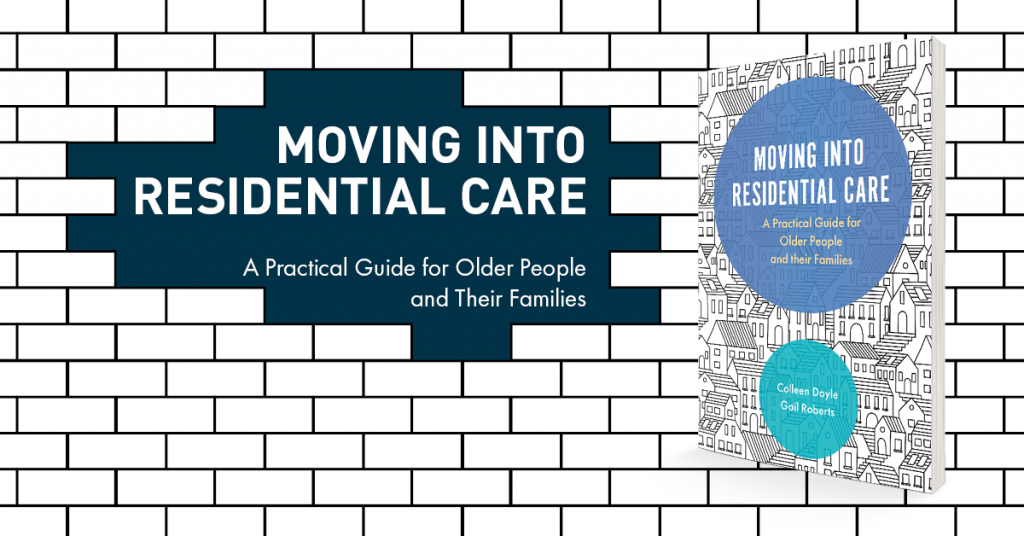 Moving into residential care is not an easy decision. Some people won’t even consider the idea, whereas others might just accept it as an inevitable step. In this blog post, Colleen Doyle, co-author with Gail Roberts of Moving into Residential Care: A Practical Guide for Older People and Their Families, shares her personal experience and gives some advice on what to do when a loved one might be moving into a care home.
Moving into residential care is not an easy decision. Some people won’t even consider the idea, whereas others might just accept it as an inevitable step. In this blog post, Colleen Doyle, co-author with Gail Roberts of Moving into Residential Care: A Practical Guide for Older People and Their Families, shares her personal experience and gives some advice on what to do when a loved one might be moving into a care home.
“No care home is perfect, so people need to work out what is most important to the individual and focus on how to achieve that”
Moving into residential aged care is a step that is dreaded by many older people. My parents were born in the 1920s and were part of the generation that valued stoicism as an approach to many of the challenges that life brought. Before I was born, my parents spent many years living in remote Australia while my father worked along the railway line that snaked its way through the central deserts of Australia. My mother coped with caring for my two older siblings while living in the desert. My father was by necessity a great inventor whose creative solutions enabled them to live independently when support services were non-existent. When he came to the end of his life he, like many people, let it be known that under no circumstances whatsoever would he consider moving into a nursing home. For someone who had spent most of his life in control and fending for his family, the thought of being at the mercy of health services was too much to bear. In fact he faced his terminal cancer at home, being cared for by a wonderful palliative care team, and spent his last week of life in a palliative care unit of the local country hospital. When my mother was faced with the same challenges at the end of her life ten years later, she acknowledged that care at home was not an option and asked her children to ‘find me a good home’, a task that was very daunting even for those of us who had worked in aged care for a long time.
Both circumstances are commonly faced by families and older people who have all to work out what is the best solution for providing good quality of life, when people’s health may also be deteriorating and services may not match what an individual wants. Families need help to choose the right services for their older relative in a time when there seems to be very little that will satisfy all the needs of the individual. Sometimes if the older person is having to move unexpectedly, the rush in decision making can make the situation even more stressful. Very often the emotional response to residential care is very negative. In our book we emphasise that allowing the older person themselves to have control and lead decision making as much as possible will assist them to adjust to the move. We have found that there is information available, including for example checklists to help with choosing residential care. However the checklists are generic, and what needs to be considered are the main priorities of the individual – not only what their health care needs are but what gives them purpose or meaning in their life. No care home is perfect, so people need to work out what is most important to the individual and focus on how to achieve that. The coping styles of individuals will contribute to how long it takes to adjust to their changed circumstances. One of my mother’s favorite responses to her own chronic pain was ‘it will pass’. Being able to let go, and focusing on the positives in the moment can help older adults to get through difficult days. Older people have a lifetime of experience, diverse backgrounds and varied family supports, all of which will impact on how they approach moving into residential care.
We hope that this book will provide valuable advice to help older people and their families and friends who are considering a move to residential care. Our book brings together the latest research on what helps and what does not help during a move to residential care, advises where to find some of the latest resources that are available on the internet, and describes some stories from people who recently experienced the move. Everyone has different life experiences and circumstances, but we share the common goal of having the best quality of life possible, no matter where we live.
Colleen Doyle is Professor of Aged Care at Australian Catholic University and Honorary Research Fellow at the National Ageing Research Institute. She is the co-author with Gail Roberts of Moving Into Residential Care: A Practical Guide for Older People and Their Families, Jessica Kingsley Publishers, December 2017
If you would like to receive the latest news and offers on our Dementia and Older People Care books, why not join our mailing list? We can send information by email or post as you prefer. You can unsubscribe at any time.
More info on care homes please. We care for 8 snr citizens with Dementia in SA